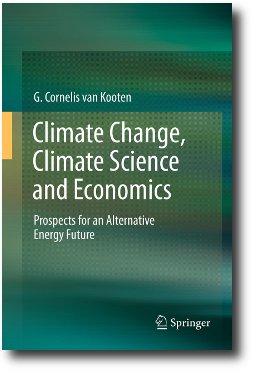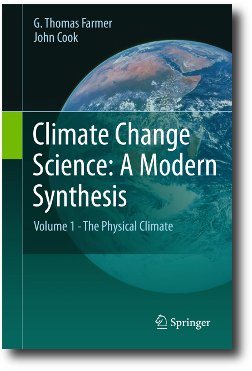Two new university level text books have hit the shelves, both coming from the Springer stable. I thought it rather interesting that the publisher had turned out two such contrasting takes on the climate debate almost simultaneously. Also, both books take interesting diversions from their main subject matter.

Cornelis van Kooten is a resource economist from the University of Victoria in Canada and his book is entitled Climate change, climate science and economics. Although Springer bill it as a research level text it's written in highly accessible fashion. The focus is very much on the economics, looking at emissions scenarios and climate models, cost-benefit analyses, impacts assessments, and the whole gamut of more or less sane policy responses. But the first few chapters focus on the science, with solid discussions of the temperature records and the paleoclimate studies, and with diversions into the discoveries of the blogosphere. Names familiar to those in the climate blogosphere abound: McIntyre and McKitrick, Watts, Mosher and even someone called Montford, who is cited more than once.
If I have a bone of contention it's with the price. I know academic books are expensive, but £100 pounds for an ebook? That is absurd and a wasted opportunity. Van Kooten's book feels to me like The Skeptical Environmentalist, both in tone and importance for the general reader. It should have been priced accordingly.
 Climate Change Science: A Modern Synthesis - Vol 1 The Physical Climate also has a diversion in an unexpected direction. The book is by Thomas Farmer and John Cook, the former an environmental consultant and the latter needing little introduction as the man behind Skeptical Science. Apparently the first in a multi-volume set, it focuses on the physical science, although it rather sets out its stall as a work of political advocacy by including in its introduction a section on the Hockey Stick controversy.
Climate Change Science: A Modern Synthesis - Vol 1 The Physical Climate also has a diversion in an unexpected direction. The book is by Thomas Farmer and John Cook, the former an environmental consultant and the latter needing little introduction as the man behind Skeptical Science. Apparently the first in a multi-volume set, it focuses on the physical science, although it rather sets out its stall as a work of political advocacy by including in its introduction a section on the Hockey Stick controversy.
It is directed at "the introductory science student who has perhaps not had a science course since secondary or preparatory school", and the early sections therefore cover things like the scientific method, before moving on to the meat of the text with section on the atmosphere, the oceans, climate models and so on.
The diversion is at the end of the book, where the authors take a diversion off into Lewandowsky territory: Part X is about "Climate Denial" and Part XI is on "Specific Declarations against Climate Science and Climate Scientists". I'm sure readers here can guess what this is like. This kind of activist talk sits extremely uncomfortably in a book that it is supposed to be about the physical climate, although I'm actually rather surprised to see this kind of thing in an academic work at all.
But let me close by noting one particularly interesting comparison between the two books. Farmer and Cook include considerable discussion of conspiracy theories - the word "conspiracy" appears more than a dozen times and "hoax" nine times. Lewandowsky's "unpublished" paper on conspiracy theories among "deniers" is cited approvingly.
Meanwhile, van Kooten's book doesn't mention "conspiracy" or "hoax" at all.
Doesn't that tell a story?